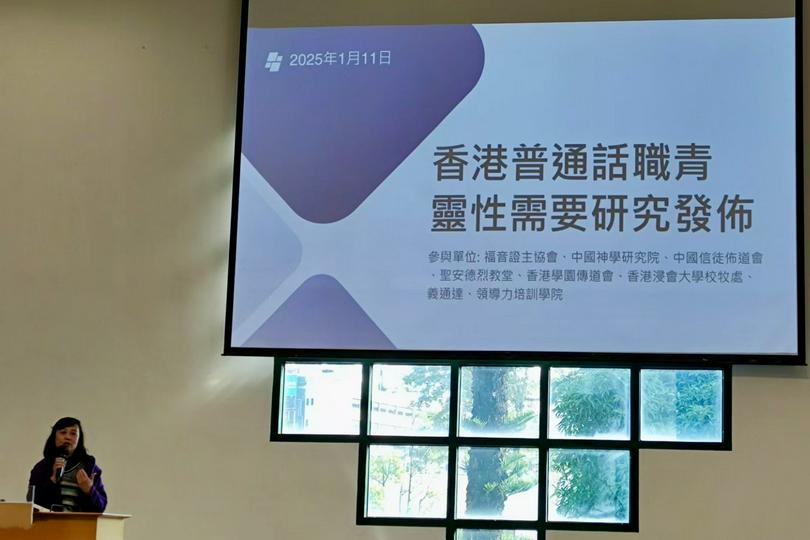On January 11, 2025, China Graduate School of Theology (CGST) and Christian Communications Ltd. jointly hosted a sharing session titled "Riding the Waves: Opportunities for Welcoming Mandarin-speaking Groups" at CGST, aiming to offer a platform for participants to share information and exchange experiences, foster greater collaboration and equip the community to better welcome these new neighbors.
The event was divided into two parts. The first half featured a welcome and introduction, the release of a survey on the "Spiritual Needs of Mandarin-Speaking Young Professionals in Hong Kong," themed information, and a Q&A session. The second half was an experience-sharing session divided into four thematic groups.
With Hong Kong witnessing its first wave of mainland families arriving through various talent admission schemes this year, the two organizations that hosted this gathering conducted the survey mentioned above. Dr. Suanne So, assistant professor of practical studies at CGST began the first half by sharing the survey results.
The qualitative study used semi-structured interviews with a representative sample of 10 men and 10 women, half Christians and half non-Christians. The research referenced Arnett's Emerging Adulthood theory and Fisher's spiritual health model, focusing on four dimensions: adaptation in Hong Kong, social situations, mental health, and life meaning.
Dr. So detailed the findings, noting that respondents generally found Hong Kong vibrant, international, and offering a relatively fair work environment with boundaries. However, they needed to adapt to the humid weather and limited food options. While they valued the opportunities and potential life experiences, high housing prices ultimately deterred long-term settlement, leading many to base their decision to stay on career development after obtaining residency through seven years of work. This professional uncertainty coupled with narrowing social circles, as building relationships with colleagues proved difficult and maintaining deep friendships demanded scarce energy, although understanding Cantonese helped bridge the cultural gap. The situation often triggered mental challenges including frustration and anxiety, especially among high achievers confronting unclear prospects, while the high cost of living strained independence and contributed to emotional fluctuations and persistent loneliness. Nevertheless, most people maintained their belief in life's meaning by focusing on concrete goals like family happiness and career success, whereby Hong Kong's religious freedom prompted spiritual exploration among non-believers and deeper faith reflection among believers, as the novel environment and inherent instability naturally led to contemplation of life's meaning and transcendence.
Dr. Lui Hing-hung, associate general secretary (Ministries) of Christian Communications Ltd., then shared suggestions and challenges regarding the survey, emphasizing the need for Hong Kong churches to increase cultural difference sensitivity, recognizing that Hong Kong and the Mainland are not entirely similar. Different cultural perspectives lead to different experiences, such as some finding Hong Kong's religious freedom high, requiring churches to think from multiple angles and empathize. The cultural divide further manifests in contrasting privacy norms, where Mainland Chinese view direct inquiries about personal matters like income and marital status as expressions of care, while Hong Kongers consider such questions intrusive. Similarly, hospitality customs differ significantly, with Hong Kong's spatial constraints limiting traditional hosting practices compared to the Mainland's more comprehensive approach to hospitality, thereby necessitating churches to reconsider and adapt their ministry methods.
Dr. Lui further emphasized that churches must create space for innovation when serving Mandarin-speaking young professionals, encompassing mission education, mobilization, and cross-cultural adaptation, while remaining vigilant about challenges like short-term growth patterns and cultural integration issues. Although surface similarities may create a false sense of familiarity, churches must conduct ongoing research into varying generational needs, develop new church planting approaches, and examine their role in a globalized context, all while reflecting deeply on the distinctive identity of Hong Kong churches.
Dr. Song Jun, and Philip Teng, associate professor (theological studies) and director of the Chinese Culture Research Centre at CGST, delivered a themed sharing that reviewed the waves of immigration in Hong Kong. He traced the history from the mid-19th century indigenous population to the refugees of the 1960s, the marginalized groups of the 1970s, and the Mainland tourists criticized for uncivilized behavior in the early 21st century. Today, Hong Kong faces a significant influx of talent alongside the emigration of its residents. Regarding hospitality, Dr. Song referenced Psalm 23, comparing God to a generous host, encouraging everyone to warmly welcome Mandarin-speaking groups. Through scriptural interpretation, he explained how a host's companionship can help those in adversity see themselves anew, encouraging everyone to be good hosts. He also emphasized the importance of moderate hospitality and a hosting style that allows guests to contribute.
In the Q&A session, the speakers discussed topics such as social media usage, the impact of political events, new forms of church, and changes in Mainland students' church participation after returning to the Mainland. They pointed out differences in social media habits and culture between Mainlanders and Hong Kongers, with respondents' social circles shrinking due to social events and the pandemic, focusing more on practical life issues. Moreover, they emphasized the importance of attracting people to faith through church activities and being aware of differing expectations of the church among people from different backgrounds. In addition, the speakers also mentioned the exclusionary mentality in Hong Kong churches, urging reflection on cognitive attitudes, proactively reaching out to people from different backgrounds, encouraging them to make local friends in their life circles, thinking from a host's perspective, and equipping themselves to interact with people from different cultural backgrounds.
Finally, a minister shared his experience with the Mandarin ministry for Mainland students, noting that simply hosting students was insufficient in the past. One should consider how to utilize students' expertise, allowing them to pass on knowledge and participate in church ministry. He gave examples of inviting students to participate in community service, visiting elderly living alone, and letting them experience faith in practice and feel life's value and meaning. Additionally, by offering interest classes and inviting talented students to help, such as writing Spring Festival couplets, they could gain insights through participation.












